Features
PERUVIANS STAND UP TO NEWMONT MINING
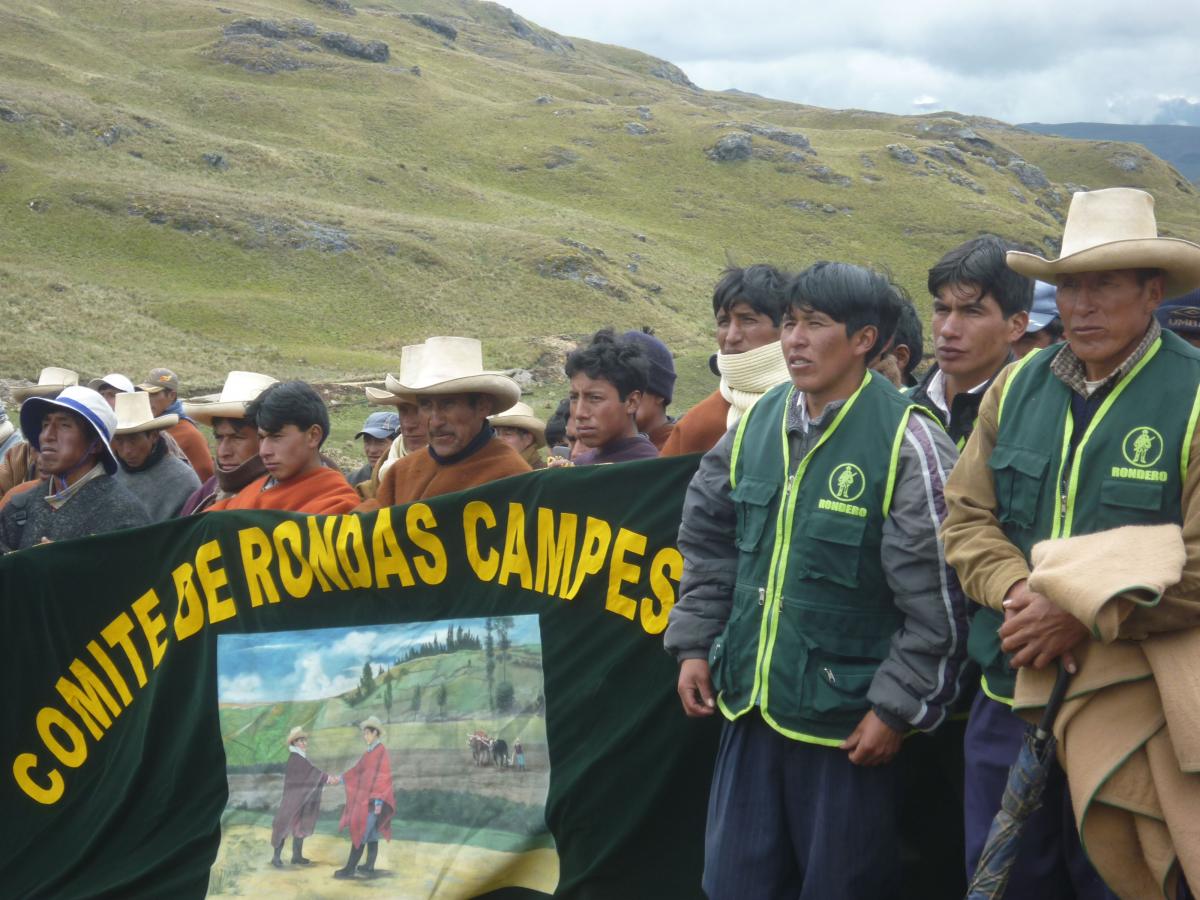 by Bill Weinberg, The Progressive
by Bill Weinberg, The Progressive
The Newmont Mining Corporation, based in Colorado, has embroiled itself in a controversial project in northern Peru that locals say threatens their water and their future. Peasants and workers in the region have engaged in mass demonstrations and general strikes, and the president of Peru has responded by declaring a state of emergency. At stake is the economic model of aggressive resource extraction lubricated by the new free trade agreement with Washington.
GUANTÁNAMO DETAINEES: THE "OTHER" VICTIMS OF 9-11
by David Frakt, JURIST Forum
On September 11, 2012, as the nation remembered those who lost their lives in the horrific and senseless attacks of 9-11, the government released information about the death of Guantánamo detainee Adnan Farhan Abdul Latif. His story exemplifies how many of the detainees are also victims, not of terrorism, but of the war on terror.
As a result of the Bush administration's overreaction to the actions of a small terrorist network, 787 men have been detained at Guantánamo Bay since it opened in January 2002—only a handful with any connection to the attacks on September 11, 2001. Many detainees, including several later proven to be innocent, have been subjected to torture. Most were subjected at least to inhumanity and abuse, especially during the early years when our government did not recognize that the Geneva Convention requirements of humane treatment applied to detainees. Of the over 600 detainees released, none have ever received compensation of any kind from the US government, or even so much as an apology or acknowledgment that they were wrongfully imprisoned.
YEAR TWO OF THE ARAB REVOLUTIONS
by Kevin Anderson, US Marxist-Humanists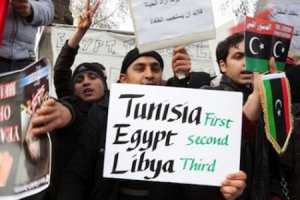
Beset by the twin dangers of Islamism and nominally secular authoritarianism, the Arab revolutions continue to shake up the region as they move through their second year. This essay, which first appeared in Logos, Vol. 11, Issues 1-2 (Spring-Summer 2012), is based upon a presentation to a Convention of the International Marxist-Humanist Organization in Chicago on July 14, 2012 — Editors
MEXICAN PEACE CARAVAN OCCUPIES WALL STREET
Opposing the "Drug War" on Both Sides of the Border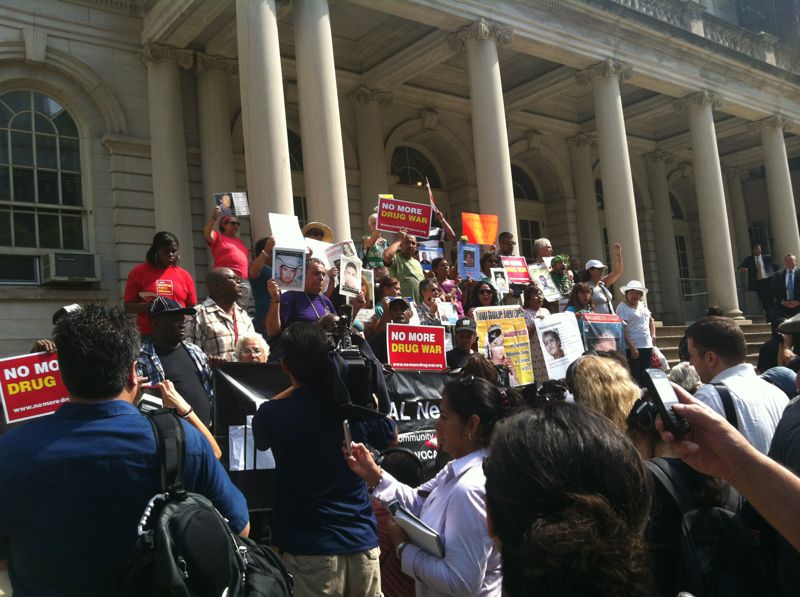
by David L. Wilson, New York Indymedia
The well-known Mexican poet and author Javier Sicilia stood on the steps of New York's Federal Hall a few feet from George Washington's statue on a hot, humid Friday afternoon and pointed across Wall Street to the Stock Exchange. "That building," he called out in Spanish, "is a symbol of the finance capital that launders money."
Surprised tourists, office workers returning from lunch, and a contingent of police on motor scooters watched from the street below. "That building," Sicilia went on, in the low-key style of someone more accustomed to poetry readings than to political speeches, "is a symbol of the finance capital that profits off narco-trafficking."
GOLDCORP ON TRIAL
First International People's Health Tribunal Held in Guatemala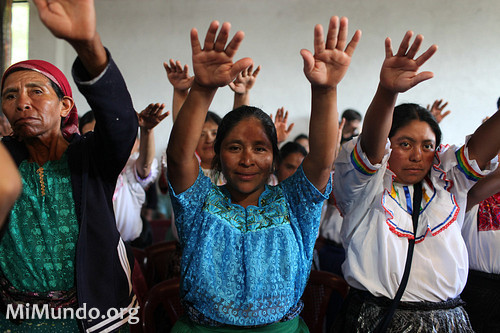 by Beth Geglia and Cyril Mychalejko, Toward Freedom
by Beth Geglia and Cyril Mychalejko, Toward Freedom
“A few years ago, our people, the people you can see around you, we began to realize what was happening,” Maudilia López told the hundreds gathered to attend the first ever People's Health Tribunal in San Miguel Ixtahuacán, Guatemala. The event was packed, even as some attendees spilled out of the entrance of the crowded room, others shuffled to find a spot.
The International Peoples’ Health Tribunal (IPHT) took place on the second floor of the parish hall of San Miguel Ixtahuacán, a municipality in Guatemala's western Highlands of roughly 60,000 people, a majority of whom are Maya-Mam. San Miguel Ixtahuacán is the main site of the Marlin mine, an open-pit gold mine that is one of the most important projects of Canadian mining giant Goldcorp Inc.
THE BABAR AHMAD CASE: DO U.S. PRISONS VIOLATE EUROPEAN HUMAN RIGHTS LAW?
An interview with Hamja Ahsan and Aviva Stahl
by Angola 3 News
On April 10, the European Court of Human Rights (ECHR) issued judgement in the case of Babar Ahmad and Others v The United Kingdom, making a landmark ruling on the legitimacy of solitary confinement, extreme isolation and life without parole in US supermax prisons. The ECHR denied the appeal filed jointly by six appellants, consisting of four British nationals (Babar Ahmad, Haroon Rashid Aswat, Syed Talha Ahsan, and Mustafa Kamal Mustafa AKA Abu Hamza), an Egyptian national (Adel Abdul Bary) and a Saudi Arabian national (Khaled Al-Fawwaz), who have been imprisoned in the United Kingdom, pending extradition to the United States for alleged terrorism-related activities.
BOLIVIA'S AYMARA DISSIDENTS
An Interview with Davíd Benigno Crispin Espinoza of the National Council of Ayllus and Markas of Qullasuyu (CONAMAQ)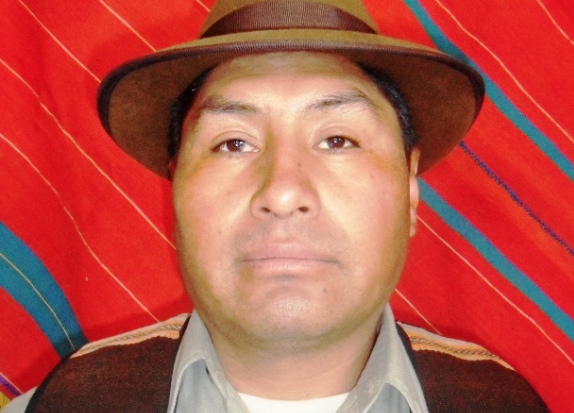
by Bill Weinberg, Indian Country Today
With a second cross-country protest march by indigenous rainforest dwellers and their allies now advancing on La Paz, it is clear that Bolivia’s indigenous peoples are divided in their positions on President Evo Morales, a populist and declared socialist of pure Aymara descent. The first march called to protest the controversial new highway slated to cut through the Isiboro Sécure National Park Indigenous Territory (TIPNIS) in October saw police repression and counter-protests by supporters of the road project. Then, in January, pro-highway marchers—also mostly indigenous—held their own, smaller, march on La Paz. The government claimed this march as a mandate for the highway, and passed a law establishing norms for "prior consultation" with indigenous peoples in the project. The new march against the road is a clear rejection of this law.
INDIGENOUS NASA RESIST MILITARIZATION IN CAUCA, COLOMBIA
by Gina Spigarelli, FOR Colombia On July 11, the indigenous Nasa of Cauca, Colombia began confronting armed groups face to face and peacefully asking them to leave Nasa territories. They removed police trenches from the urban center and disassembled homemade FARC missiles found on their lands. Four hundred Nasa members occupied and observed army soldiers on the sacred indigenous site of El Berlin outside of Toribío, where the army is protecting private cell phone company towers.
On July 11, the indigenous Nasa of Cauca, Colombia began confronting armed groups face to face and peacefully asking them to leave Nasa territories. They removed police trenches from the urban center and disassembled homemade FARC missiles found on their lands. Four hundred Nasa members occupied and observed army soldiers on the sacred indigenous site of El Berlin outside of Toribío, where the army is protecting private cell phone company towers.
On July 16, when the military had yet to retreat from indigenous lands by the proposed deadline of the previous day, the Nasa forcibly removed troops from El Berlin’s mountaintop base. Dramatic photos of the event splashed across national and international news, some featuring members of the Nasa indigenous community surrounding several soldiers, picking them up, and moving them away from their posts and others featuring crying Colombian officer Sergeant Garcia, retreating from the encampment.















Recent Updates
18 hours 45 min ago
3 days 18 hours ago
3 days 19 hours ago
3 days 23 hours ago
4 days 22 min ago
4 days 17 hours ago
4 days 17 hours ago
6 days 2 hours ago
6 days 16 hours ago
6 days 17 hours ago